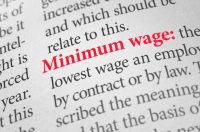Maine Minimum Wage Increase Set to Take Effect January 1
Changes to the Maine minimum wage law taking effect January 1 mean that the minimum wage for tipped workers will continue to be $5 an hour instead of rising $1 an hour like the minimum wage for workers who don’t receive tips.










